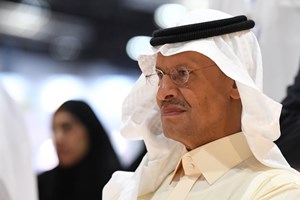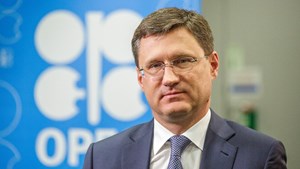OPEC shocks oil markets with plan to keep crude output constrained
LONDON (Bloomberg) -- Saudi Arabia and its OPEC+ allies shocked the oil market with a decision to keep supply in check, sending prices surging and adding inflationary pressure to the global economy as it emerges from the pandemic.
One year on from the outbreak of a bitter price war that sent crude below zero, the kingdom showed that its priority is preserving the hard-won oil recovery rather than worrying about tightening the market too much.
“I don’t think it will overheat,” Saudi Energy Minister Prince Abdulaziz bin Salman told reporters after Thursday’s meeting. Last year “we suffered alone, we as OPEC+” and now “it’s about being vigilant and being careful,” he said.
The Organization of Petroleum Exporting Countries and its allies had been debating whether to restore as much as 1.5 million barrels a day of output in April. From trading houses in Geneva to Wall Street banks, much of the oil world was in agreement that global markets could use some more barrels to temper a rapid run-up in prices.
But after being urged to “keep our powder dry” by Prince Abdulaziz, OPEC+ members agreed to hold steady at current levels -- with the exception of modest increases granted to Russia and Kazakhstan. Saudi minister went one step further, saying the additional 1 million barrel-a-day voluntary production cut the kingdom introduced last month was now open ended.
That means the cartel will still be withholding about 7 million barrels a day from the market -- equivalent to about 7% of global demand -- even as fuel consumption recovers in many countries.
“OPEC+ definitely risks over-tightening the oil market,” said Amrita Sen, chief oil analyst at consultant Energy Aspects Ltd. in London. Brent crude rose as much as 5.7% in London.
Inflation Risks
Brent has already rallied about 30% this year to almost $68 a barrel. Throughout the first quarter, OPEC+ has kept production below demand in order to drain the glut that built up during the worst of the Covid-19 lockdowns. Without additional supply, that deficit will widen significantly in April, according to the cartel’s internal estimates.
“We expect oil prices to rise toward $70 to $75 a barrel during April,” said Ann-Louise Hittle, vice president of macro oils at consultant Wood Mackenzie Ltd. “The risk is these higher prices will dampen the tentative global recovery. But the Saudi energy minister is adamant OPEC+ must watch for concrete signs of a demand rise before he moves on production.”
With the bond market already on edge for signs of inflation, the aggressive move from OPEC+ could become a headache for the U.S. Federal Reserve and the European Central Bank. And it’s not just oil that’s surging. From copper and steel to corn and soybeans, the prices of many commodities are rapidly rising.
Strengthening economies, the rollout of coronavirus vaccines and continued government stimulus are among the reasons financial markets are anticipating an acceleration in price growth, although such forces are countered by weak labor markets.
“We should closely monitor to avoid overheating of the market,” Russian Deputy Prime Minister Alexander Novak said in an interview with state TV Rossiya 24 after the meeting.
U.S. Relations
The decision comes at a tense moment for the Saudi-American alliance, as President Joe Biden seeks to reset the relationship with Riyadh, and particularly with Crown Prince Mohammed bin Salman.
Under former President Donald Trump, the White House may have reacted quickly with a barrage of tweets to the threat of rising gasoline prices, as it did in April 2018. The reaction of the Biden administration is unclear, however, and may not be as straight forward as it balances economic priorities against green policies.
Russia and Kazakhstan secured exemptions from the deal, allowing them to boost output by 130,000 and 20,000 barrels a day in April, respectively, “due to continued seasonal consumption patterns,” according to a statement posted on OPEC’s website. The two nations were granted similar allowances for February and March.
OPEC+ will meet again on April 1 to discuss production levels for May, according to the statement.
Click here to subscribe to the World Oil energy newsletter, and receive exclusive industry news and analysis in your inbox each weekday.




